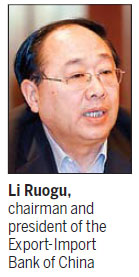 |
|
|
|
|||||||||||

China is in position to direct more foreign capital toward acquisitions
China is gearing up to channel more foreign reserves toward overseas acquisitions, a top banker has said.
Li Ruogu, chairman and president of the Export-Import Bank of China, said the next two years would be a key period for Chinese enterprises to buy overseas assets from European and North American companies.
"We expect the State Administration of Foreign Exchange will set a higher foreign currency quota for us to support enterprises' overseas purchases," he told China Daily in an exclusive interview.
The Export-Import Bank of China is one of two major non-commercial banks, along with the China Development Bank, supporting Chinese enterprises going overseas.
Li said last year about one-third of the bank's total loans were in foreign currency, and he expected the ratio would rise to almost one half in 2012.
"In the next two years, Chinese enterprises have very good opportunities to purchase more national resources and financial institutions in emerging markets and Australia," Li said. "But that would be from the hands of players in Europe or the United States, as they've been severely influenced by the economic slowdown and debt plague," he said.
Li, also a member of the National Committee of the Chinese People's Political Consultative Conference, made the remarks on the sidelines of the annual session of China's top political advisory body.
The Export-Import Bank of China is prominent in the African market while the Chinese Development Bank stands out in Latin America and Central Asia through backing local acquisitions by Chinese companies.
"We are planning to broaden overseas networks in Europe, US and Africa to strengthen support for increasing overseas acquisitions by Chinese enterprises," Li said.
It now has offices in France, Russia and South Africa.
According to Pricewaterhouse-Coopers, mergers and acquisitions by Chinese companies continued to be active in 2011, with transactions during the year increasing 5 percent to a record high 5,364.
It said more Chinese mainland enterprises will be seeking overseas acquisitions in 2012.
"We have noticed a rising demand from our clients to borrow foreign currency, especially dollar-denominated loans to make overseas purchases. But given that China still has restrictions for exchanging the yuan into other currencies, we could only lend out very limited loans in foreign currency," he said.
"The foreign exchange watchdog should not set any quota in that regard, given that the currency exchange with the non-commercial banks will not pose any investment risk to the foreign exchange reserves."
Li Jie said the move will reduce the central bank's yuan-denominated debts, and cut into the country's $3.2 trillion in foreign reserves, a result that China would like to see.
The large amount of foreign reserves will be increasingly challenging for China's asset management, said Yi Gang, deputy governor of the central bank and head of the State Administration of Foreign Exchange.
He said as companies and individuals generate more willingness to obtain foreign currencies for overseas investment and purchases, the foreign reserves will decline naturally and the investment dilemma for the government will be eased.
Guo Tianyong, an economist at the Central University of Finance and Economics, said earlier that China should use its foreign reserves to back investment by domestic enterprises in the real economy overseas, rather than focusing on stable returns and risk control.